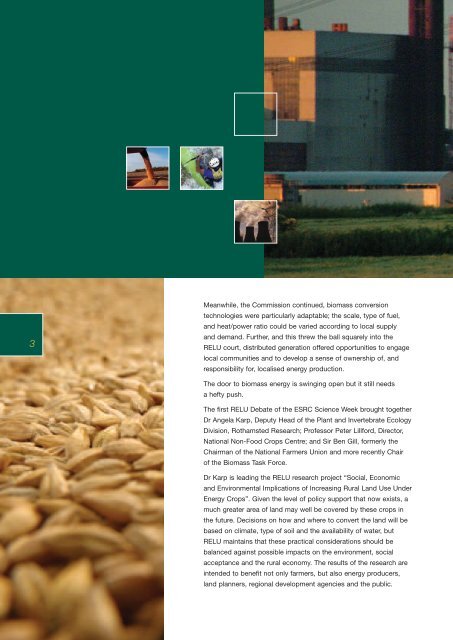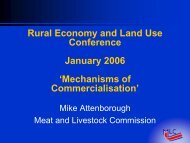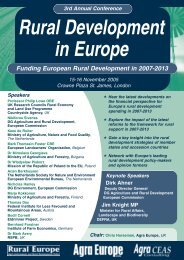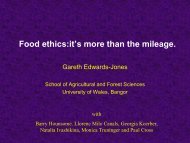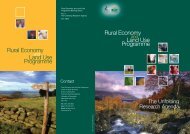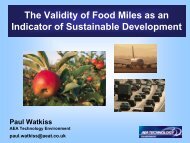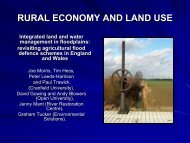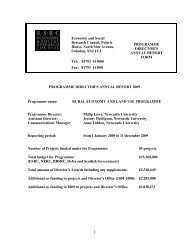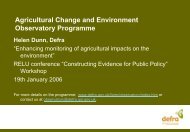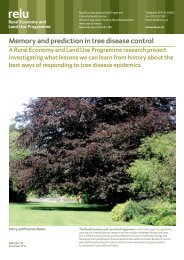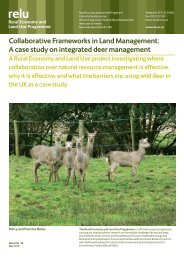Download pdf - Rural Economy and Land Use Programme
Download pdf - Rural Economy and Land Use Programme
Download pdf - Rural Economy and Land Use Programme
You also want an ePaper? Increase the reach of your titles
YUMPU automatically turns print PDFs into web optimized ePapers that Google loves.
© Countryside Agency, Ian Dalgleish<br />
Meanwhile, the Commission continued, biomass conversion<br />
By 2006, levels of CO 2 in the atmosphere had risen to record levels. “We cannot keep<br />
technologies were particularly adaptable; the scale, type of fuel,<br />
depleting fossil fuels <strong>and</strong> emitting greenhouse gases,” Karp says, “but we can grow our<br />
<strong>and</strong> heat/power ratio could be varied according to local supply<br />
own energy.” As to carbon emissions, the CO 2 given off when biomass crops are burned<br />
<strong>and</strong> dem<strong>and</strong>. Further, <strong>and</strong> this threw the ball squarely into the<br />
3 4<br />
RELU court, distributed generation offered opportunities to engage<br />
to produce heat <strong>and</strong> electricity are taken up by the next generation of crops as they are<br />
grown, so biomass energy is practically carbon neutral.<br />
local communities <strong>and</strong> to develop a sense of ownership of, <strong>and</strong><br />
In 2003 the UK had some 2,000 ha of l<strong>and</strong> producing energy crops: principally miscanthus<br />
responsibility for, localised energy production.<br />
grass, short rotation coppice willow <strong>and</strong> poplar. Dr Karp quotes a target of 6% of UK<br />
The door to biomass energy is swinging open but it still needs<br />
electricity by 2020. A school, hospital or even farm could have its own bio-power station<br />
a hefty push.<br />
with the national grid used only as back-up!<br />
The first RELU Debate of the ESRC Science Week brought together<br />
Dr Angela Karp, Deputy Head of the Plant <strong>and</strong> Invertebrate Ecology<br />
Division, Rothamsted Research; Professor Peter Lillford, Director,<br />
National Non-Food Crops Centre; <strong>and</strong> Sir Ben Gill, formerly the<br />
Chairman of the National Farmers Union <strong>and</strong> more recently Chair<br />
of the Biomass Task Force.<br />
Dr Karp is leading the RELU research project “Social, Economic<br />
<strong>and</strong> Environmental Implications of Increasing <strong>Rural</strong> L<strong>and</strong> <strong>Use</strong> Under<br />
Energy Crops”. Given the level of policy support that now exists, a<br />
much greater area of l<strong>and</strong> may well be covered by these crops in<br />
the future. Decisions on how <strong>and</strong> where to convert the l<strong>and</strong> will be<br />
based on climate, type of soil <strong>and</strong> the availability of water, but<br />
RELU maintains that these practical considerations should be<br />
balanced against possible impacts on the environment, social<br />
acceptance <strong>and</strong> the rural economy. The results of the research are<br />
intended to benefit not only farmers, but also energy producers,<br />
l<strong>and</strong> planners, regional development agencies <strong>and</strong> the public.<br />
A large-scale change of use of l<strong>and</strong> to biomass crops will have wide ranging implications for<br />
the countryside. The visual appearance <strong>and</strong> character of the l<strong>and</strong>scape will change, but farm<br />
income could well increase. Income from tourism needs to be monitored as does water use<br />
<strong>and</strong> biodiversity. “Meanwhile,” Karp asks, “in a situation where we badly need extra sources<br />
of energy, what would you rather have More nuclear power stations More wind farms<br />
Or more fields of crops”<br />
Sir Ben Gill sees as his point of departure the global oil situation. Something has to be done<br />
urgently, he says, because the total oil reserve remaining worldwide is 1,000 billion barrels;<br />
at current consumption levels this means we only have enough oil for the next 33 years!<br />
Meanwhile, oil production is at its peak, while dem<strong>and</strong> <strong>and</strong> price are soaring. “Our gas supply<br />
is at the far end of a very long pipeline, with Germany <strong>and</strong> the rest taking their share first.<br />
The recent dispute between Russia <strong>and</strong> the Ukraine over gas should make anyone nervous,”<br />
Gill says. “Add to this the concerns over climate change, population explosion, world trade<br />
liberalisation, Common Agricultural Policy reform <strong>and</strong> food chain issues <strong>and</strong> we are living<br />
in a time of enormous pressure for change.”


